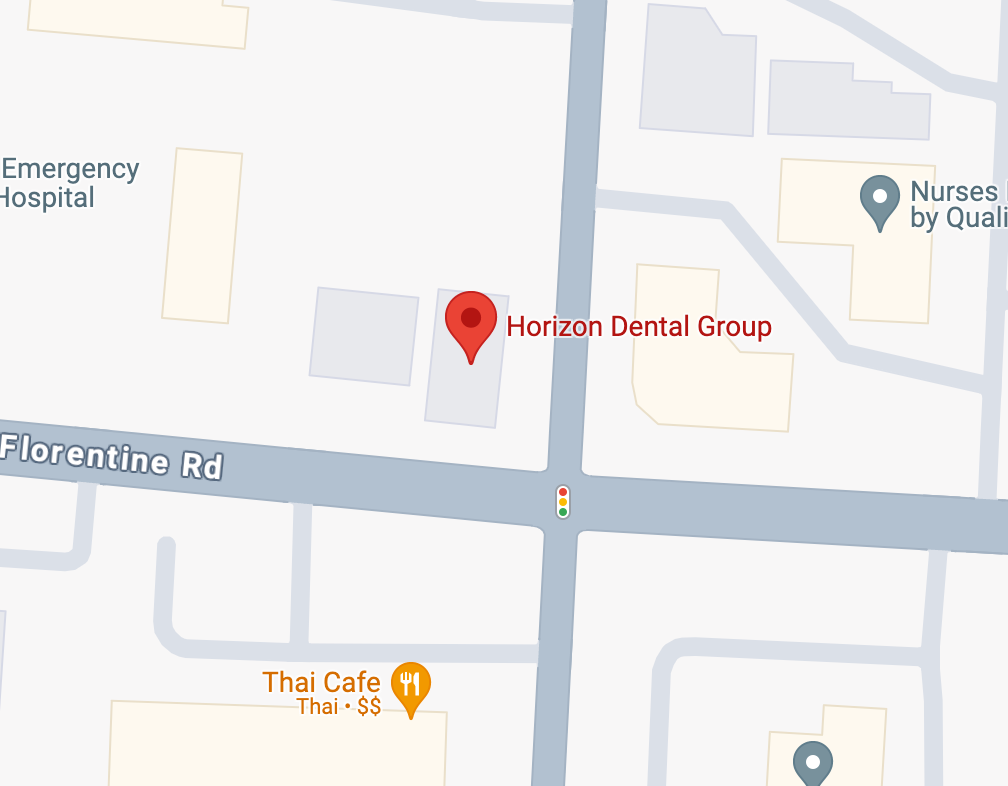(928) 772-9860
7890 E. Florentine Road Prescott Valley, AZ 86314
Emergency Dental Services in Prescott Valley

Emergency Services
At Horizon Dental of Prescott Valley we prioritize your dental health, even when the unexpected happens like a dental emergency.
If you have a dental emergency, please call our office and talk with our team about scheduling an emergency appointment! (928) 772-9860
Dental emergencies can happen any day, at any time, and cause pain or discomfort. Emergencies would include:
- Severe toothaches
- Teeth that have been knocked out
- Broken or chipped teeth
- Injured gums or mouth
If you think that you are experiencing a dental emergency, it’s important to call our office as soon as possible to prevent further damage and get fast relief.

Common Myths
Myth: Dental emergencies can wait and home remedies will work better.
Fact: While home remedies are great for temporary relief, it’s important to get an appointment as soon as possible to prevent more damage to the tooth and give you a more permanent fix.
Myth: Dental emergencies only solve severe pain.
Fact: Some patients may experience severe pain which is a good sign of a dental emergency, but more symptoms indicate a need to schedule an emergency appointment. These would include: Swelling, bleeding, and sensitivity.

To schedule an emergency appointment, give our office a call at (928) 772-9860.
Our Services:
Frequently Asked Questions
An emergency is considered any pain or sensitivity revolving around the teeth or gums. This can include but is not limited to a severe toothache, a knocked-out tooth, chipped or broken teeth, broken fillings or crowns, swollen gums, or bleeding that does not stop. Please give us a call and schedule an appointment so we can fix the issue.
Emergency rooms are great for when you need relief for only certain emergencies. Usually, the ER does not have the correct equipment to take care of dental issues that come up. When it comes to dental, it’s best to schedule an appointment with a skilled dentist to get the best results.
When a tooth gets knocked out, make sure to call our office as soon as possible. There are a few things that you need to do to make sure that the tooth is in good condition. Make sure you hold the tooth by the top, not the root. Rinse with water and carefully reinsert the tooth into its socket if possible, if not, keep the tooth in a damp towel with milk or water. Again, please give us a call as soon as possible to fix the tooth.
If you have a severe toothache, make sure to rinse your mouth with warm water and remove any food that is stuck with floss. Do not place aspirin on the tooth or gums as this can create more problems.
Yes, we can schedule an emergency appointment whether you are a new patient or an existing one. We want to make sure that you are out of pain and taken care of.
If you have bleeding gums or swelling, make sure to rinse your mouth with warm water and salt. You can also apply an ice pack to your cheek to reduce the swelling in that area. Don’t forget to call us to schedule an emergency appointment as soon as possible.
In case of a dental emergency involving a child, stay calm and act quickly. Follow the same steps as you would for an adult and get in touch with our dentist who provides emergency pediatric dental services. We can offer specialized care tailored to the needs of children.
Depending on the insurance and the type of plan you have, most insurance covers emergency appointments. It’s best to call your insurance and find out what exact coverage you have.
To avoid needing an emergency appointment, it’s important to come into your regular checkups and cleanings, have good oral hygiene, avoid chewing on hard foods or candies, and wear a mouthguard during sports.
We want to make sure that all patients who are experiencing an emergency are seen same day or as quickly as possible.
BOOKING HOURS
M 8-4 | Tu 9-5 | Wed 8-4 | Th 8-4
We are OPEN for ALL dental care procedures and emergency needs. Protecting the health and safety of our patients, families, and team members remains our number one priority.
In-house Discount Plan*
$119.95/yr/individual & $179.95/yr/family with discounts of 20%-30% off all services.
*Sign up in office, requires upfront payment to qualify for discounts.
$99.95 Exam and X-Rays^
For New Patients without insurance we offer a great rate on your first Exam & set of X-Rays.
^For New Patients that do not have dental insurance. New patients must be 18 or older to receive this discount. Discounts cannot be combined with other offers or dental discount plans. Additional fees may be included in individual cases.
$500 off Orthodontics^^
For New Patients without insurance we offer a great rate on your first Exam & set of X-Rays.
^^For new patients without dental insurance. Once per patient.

